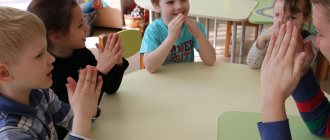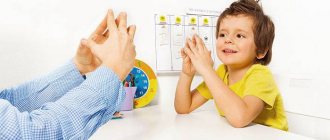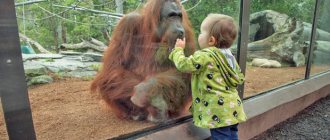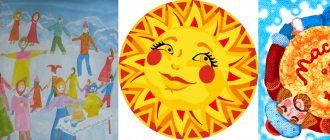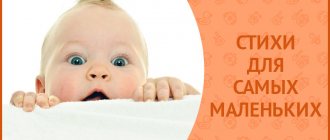I am writing today’s article as a continuation of the series of articles about finger games. It is a widely known fact that finger games contribute to the development of a child’s speech, so they occupy a significant place among other educational games. Finger games also have a beneficial effect on other areas of a child’s development; you can read more about their benefits in the article with games for babies from 6 months to 1 year (by the way, all the games in this article are also relevant for a one-year-old baby).
In any developmental activity, it is very important to maintain the baby’s interest. To do this, you need, firstly, to constantly add something new to your classes, and secondly, to gradually increase the difficulty of the added material. Therefore, I divided my entire collection of finger games into several stages in order of increasing difficulty. The breakdown by age (from 6 months, from 1 year, from 1 year 3 months, etc.), of course, is somewhat arbitrary, but it still helps the mother navigate the huge number of poems.
In this article you will find the simplest options for finger games. They are best suited for babies who have just turned 1 year old, or for those who are just starting to get acquainted with finger games. “Finger games for babies from 1 year to 3 months” are well suited for the next stage of classes.
Games for developing gross motor skills (gesture games)
Tasya, show me your hands (we stretch our hands forward)
And wave your hand. (we wave our hand)
Let's hide our fingers in a fist. (we clench our fingers into fists)
Let's put our fist on the side (we put our hands with clenched fists on our sides)
Let's stomp our feet, (stomp)
Let's clap our hands. (clap our hands)
Let's stomp with our right foot, (stomp with our right foot)
Let's shake our heads. (shaking head left and right)
We dance merrily (we make lanterns)
We dance together.
Music and song -
That's what Tasya needs.
***
So we stood on the floor,
We danced with Tasya.
We danced, we danced, (we put one leg forward, then the other)
The legs were exposed.
Clap your hands, (clap your hands)
They clapped a little.
We danced, we danced, (we put one leg forward, then the other)
The legs were exposed.
We raised our hands, (raise our hands)
They put it on the head. (put hands on head)
We danced, we danced, (we put one leg forward, then the other)
The legs were exposed.
***
So we stomp our feet (stomp our feet)
Top-top, top-top.
So we clap our hands (clap our hands)
Clap clap.
So we shake our heads. (shaking head left and right)
Oh-oh, oh-oh!
So we raise our hands, (raise our hands)
Higher, higher, higher.
So we give up, (give up)
Below, below, below.
This is how we hand out hands (we hold out hands to the baby)
So so so.
So we go round and round. (spinning in place)
So so so.
***
The bull walks, sways, (we walk on all fours)
Sighs as he walks: (sighs several times)
"Oh, the board is running out
Now I'm going to fall." (lie down on the floor)
How to properly exercise with your baby
Finger exercises for the development of speech and thinking can be done at home. The work will be easier for the baby in the presence of a loved one. Sometimes preschoolers are afraid to make the wrong movement with their hands, to complete the task incorrectly, so they work inactively during gymnastics in kindergarten. It is important to do gymnastics at home, taking into account the age characteristics of the child.
Complex for children from one to 3 years old
Finger exercises and games are especially useful for children of primary preschool age. Classes contribute to the active formation and launch of speech. Kids like to repeat the movements of adults; they listen carefully to the rhymes and songs that accompany the exercises. You can use a special speech therapy file in the game.
When conducting home exercises, you must follow the following rules:
- For children of primary preschool age, the first lessons should last no more than 1 minute, then 3-5 minutes each.
- The parent should praise the child for his successes and not scold him if he repeats the adult incorrectly.
- To make the games fun and interesting, you should use finger exercises that correspond to the age characteristics of the baby.
- For games, it is important to use songs and rhymes that the child could then repeat after an adult; they should be small and easy to understand.
- Exercises should be selected according to the degree of difficulty: start with simple ones, moving on to more complex ones.
The following complex develops the child’s speech, psychological processes, and fine motor skills of the hands.
Complex for children 4-5 years old
Gymnastics in middle preschool age is important for speech development; during this period, the baby begins to actively speak and expand his vocabulary. Normally, by the age of 4, a child should know up to 3,000 words, actively use them in conversations with adults and peers, and construct sentences correctly. Children aged 4-5 years involuntarily try to memorize poems and songs that accompany finger games, which stimulates the development of mental processes. In middle preschool age, finger gymnastics helps to correlate a word with an action, relieves tension after modeling or drawing.
Middle-aged preschoolers like exercises where they need to sing a song, learn a rhyme, and repeat after an adult. In kindergarten, during play, special attention is paid to how the baby listens and perceives the task and remembers it. The following materials can be used to conduct classes:
- cards with objects, natural phenomena, figures, etc.;
- diagrams or pictures with finger movements drawn;
- illustrations mentioned in the rhyme: animals, clothes, furniture, etc.;
- presentations to recreate a visual image.
Speech development will be facilitated by exercises where the child will need to repeat movements and words after an adult. Children 4-5 years old like to play shadow theater when they need to depict animals or plants. You can stage small productions with the children based on the fairy tale you have studied.
Complex for children 5-6 years old
Playing finger games and doing gymnastics with children of senior school age is useful as preparation for school. It is easier to master writing if fine motor skills are actively developed at home and at school. It is difficult for first-graders to relax the muscles of their hands and fingers, which provokes difficulties in writing simple calligraphic elements.
You can play with preschoolers, relying on the knowledge acquired in kindergarten: counting, colors, shapes, etc. Children like the finger game “Twister”, when you need to place your fingertips on the color that appears in the cubes. To play you will need 2 cubes, one with a color palette, the second indicating the desired finger, a multi-colored sheet in the form of circles. You can arrange competitions, study together with your parents or peers.
Exercises are used for the active work of individual fingers and their joints.
When working with older preschoolers, you can use not only exercises and games, but also special massage balls. They train the muscles of the hand and relax it. It is important to roll the object not only on the palm, but also separately on each finger, connecting them together with a ball.
It is important to observe the time frame and combination of exercises when working with children of any age. To make the process of learning and development easy and interesting for the child, you need to carry out exercises for no more than 5 minutes, alternating them with rest or self-massage of your fingers and palms.
Games and gymnastics are recommended for all preschoolers for all-round development, stimulation of speaking, creative activity, and communication skills. It is especially important to conduct classes at home, not only in a preschool institution, if the child is lagging behind in speech development. Repeated repetition of rhymes and songs during exercises and games leads to their memorization. Later, the child begins to repeat after the adult either individual words or the entire poem.
Finger games for kids to develop fine motor skills
At the age of 1 year, the child is still very small to independently make movements with each finger separately, but if we want to develop fine motor skills, then there is simply no way without these games. Therefore, all movements from the rhymes in this section must be performed by the mother with the child’s fingers. As a rule, at this age, kids with great pleasure watch interesting events unfolding in the palm of their hands :) These games helped Taisiya and me to pass the time on car trips.
Magpie-crow (run your finger over the baby’s palm)
Cooked porridge
She fed the babies
I gave it to this one, (we bend our thumb)
I gave it to this one, (bend the index finger)
I gave it to this one, (bend the middle finger)
I gave it to this one, (bend the ring finger)
But she didn’t give it to this one: (pointing to the little finger)
“Small, small, not good! (tapping on the little finger)
You didn't bring any water.
Shoo, let's go!
***
This finger is grandfather, (bend the thumb)
This finger is grandma, (bend the index finger)
This finger is daddy, (bend the middle finger)
This finger is mommy, (bend the ring finger)
This finger is me, (bend the little finger)
That's my whole family. (shaking the resulting fist)
***
One, two, three, four, five, (count all fingers one by one)
We're going to look for mushrooms.
This finger went into the forest. (bend the little finger)
This finger found a mushroom. (bend the ring finger)
I began to clean this finger. (bend the middle finger)
This finger began to fry. (bend your index finger)
This finger stood up and ate it. (we move our thumb away)
That's why I got fat! (bend your thumb)
***
This finger wants to sleep (bend the thumb)
This finger is a jump into the bed (we bend the index finger)
This finger has already taken a nap (we bend the middle finger)
This finger has already fallen asleep (we bend the ring finger)
This one is fast asleep, (we bend the little finger)
And he tells you to sleep. (clasp your fist)
***
Where is the palm? - Here! (open palm)
There is a pond on the palm. (draw a circle on your palm)
Thumb – young goose, (bend the thumb)
Index - caught, (bend the index finger)
Middle - plucked the goose (bend the middle finger)
Ring finger - heated the stove, (bend the ring finger)
And little finger cooked soup. (bend the little finger)
***
Thumb, finger, where have you been? (show thumb)
I went to the forest with this brother (massaging each finger in turn)
I cooked cabbage soup with this brother,
I ate porridge with this brother,
I sang songs with this brother,
He sang songs and played (clap our hands)
Yes, he amused all the brothers.
***
Finger, fidgety finger, (we stretch our fingers one by one, starting with the thumb, bending them)
Where have you been? Where did you have lunch?
I ate raspberries with this brother,
I ate viburnum with this brother,
With this brother - strawberries,
Why do you need finger gymnastics?
A set of games and exercises aimed at developing fingers, fine motor skills of the arms, hands, and psychological processes is represented by finger gymnastics. Classes relax, prepare you for school, improve communication with peers, and distract you from unpleasant moments. On the pads of children's fingers there are many nerve endings, the stimulation of which leads to the activation of brain activity. It has been proven that gymnastics and massage affect the development of speech, psychological processes, and writing skills.
Gymnastics goals for children of primary preschool age (1.5-3 years):
- child speech development;
- stimulation, training of the articulatory apparatus;
- developing the skill of tracking an object;
- development of psychological processes;
- rhythm training;
- improving coordination of movements;
- practicing the skill of correctly repeating the actions of other people.
In middle preschool age (4-5 years), gymnastics allows you to:
- relax tension in the muscles of the arm and hand;
- form psychological processes;
- improve fine motor skills of the hands;
- develop involuntary attention;
- stimulate the speaking process, enrich the child’s vocabulary.
For older preschoolers (5-6 years old), finger games help:
- prepare the child for school;
- stimulate cognitive activity;
- develop fine motor skills of the hands, which has a positive effect on preparation for writing;
- enrich the child’s vocabulary;
- develop the creative abilities of the baby.

